Citations: “La guerre ! c’est une chose trop grave pour la confier à des militaires” ( Georges Clémenceau ) “La politique est une chose trop sérieuse pour la confier aux politiciens” ( Charles de Gaulles ) “Le dialogue est une chose trop sensible pour le confier uniquement aux partis politiques” ( un citoyen libanais )
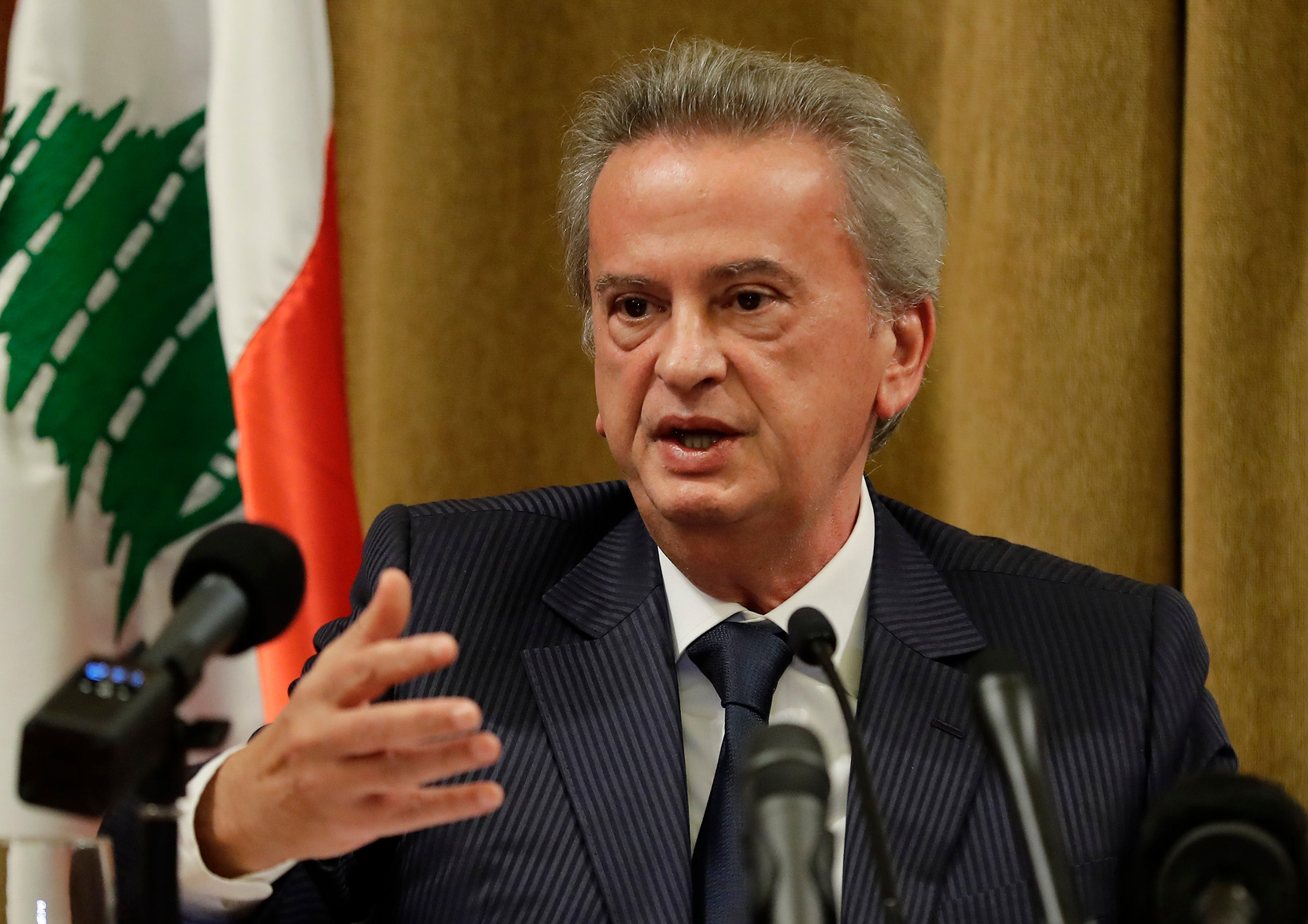
BEIRUT (Reuters), – The governor of the central bank in Lebanon said Thursday that a judge who was leading one of his investigations into him was biased. She had imposed a travel ban against him earlier this week. Riad Salmeh has denied any wrongdoing in his nearly three-decade tenure as the head of the central bank. He is currently being investigated in Lebanon and at most four European countries. This investigation comes after he was implicated in the 2019 economic crash in Lebanon. On Thursday, Judge Ghada Aoun (who is leading one of the Lebanese probes) imposed a travel ban for Salameh. According to a source, her probe covered fraud and abuse of public money. Salameh stated in a statement that he has shown respect to the judiciary through his appearances before judges. He also said that the purpose of the lawsuits against Salameh was to “distort” my image, both before the public and overseas.
Salameh who is supported by several politicians said Aoun used her private Twitter account (NYSE;) in a “hostile fashion” against him. He also criticised other aspects. of the investigation. According to simple legal rules it’s impossible for a judge and an arbiter to act at the same moment,” he stated in the statement, in which he claimed he submitted a request to remove Aoun from the case. Aoun has not yet responded to my request for comment.
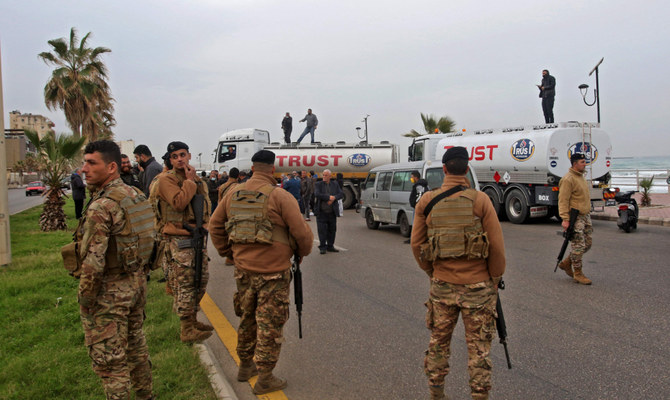
By Najia Houssari — arabnews.com — BEIRUT: Lebanon’s public transport drivers blocked roads on Thursday, paralyzing traffic throughout the country in protest against the manipulation of exchange rates that has left them out of pocket. A driver in downtown Beirut said: “We can barely afford hospitalization or medicine. We are begging healthcare associations for our rights that the state is supposed to secure for us.” Banks did not open on Thursday, as employees were unable to get to work, while schools and universities were also closed. In less than a year since the removal of subsidies, the price of a 20-liter canister of gasoline has increased tenfold to almost 400,000 Lebanese pounds ($264), while the minimum monthly wage of 675,000 pounds has remained unchanged.
Fadi Abou Shakra, a representative of Lebanon’s fuel distributors who took part in the protests, said: “Our issue with the state is the rise in the exchange rate. Officials did nothing to control the illegal platforms manipulating the exchange rate. It is not our hobby to block roads and create problems. Today is a day of anger and we’ll see what next week brings.” Soldiers and other security forces were deployed to control the situation after disputes broke out between protesters and members of the public trying to use the blocked roads. The protesters were supported by the head of the General Labor Union, Bechara Al-Asmar, who said the action was “a cry for officials to perform their role and duties toward the people.”

المؤمِنون بــــ”لبنانَ الكبير”، وهُم من جميعِ الطوائفِ والمناطق، ظنّوا أنّهم أنْجزوا مَهمَّتَهم مع إعلانِ إنشاءِ الدولةِ وانتزاعِ الاستقلالِ وإقرارِ “اتفاقِ الطائف”. وتَوقّعوا أن تكونَ المحنُ والحروبُ التي مَرّت على اللبنانيّين كافيةً ليَستخْلِصوا العِبرَ ويَقتنِعوا بكيانِ لبنانَ وخصوصيّتِه وحِيادِه وهُويّتِه. لكنَّ الـمُلحِدين بلبنان، المؤمنين بِــمشاريعَ دينيّةٍ وقوميّةٍ وانفصاليّة، وهُم من جميعِ الطوائفِ والمناطق أيضًا، شَرَعوا بتدميرِه منذ لحظةِ تأسيسِه، ولم تَنفَع لثَنيْهِم كلُّ التنازلاتِ والتسوياتِ السياسيّةِ والتعديلاتِ الدستوريّة. يُعطّلون الوِحدةَ المركزيّةَ المرتكِزةَ على دستورَي 1943 و”الطائف”، ويَرفُضون اللامركزيّةَ الضيّقةَ والموسّعةَ والفدراليّةَ. هذا النَزقُ الدُستوريُّ المتَعمَّدُ أوْدى بهم إلى اعتبارِ اللامركزيّةِ كما الفدراليّةِ تقسيمًا، بُغيةَ منعِ تطويرِ صيغةِ “لبنانَ الكبير” ورَفْدِها بعمرٍ جديد، ورغبةِ السيطرةِ على كاملِ لبنان والعيشِ على حسابِ الآخرين. هؤلاء، يُحوّلون الاعترافَ بلبنانَ وطنًا نهائيًّا إلى نهايةِ لبنانَ الوطن.
هذا المنْحى الإلغائيُّ، السائدُ في السنواتِ الأخيرة، يلتقي مع ضعفِ العناصرِ التي تُكوِّنُ وِحدةَ الأمّةِ اللبنانيّة. حين تَنشأُ الدولةُ/الأمّةُ تَستعيدُ تاريخَها وتُحدِّقُ إلى المستقبل، بيدَ أن اللبنانيّين استعادوا تواريخَ متنافِرةً وحَدّقوا إلى مُسْتقبَلاتٍ مُضادّةٍ. فلا تاريخُ الأمّةِ جَمعَهم ولا قوانينُ الدولةِ وَحَّدَتهم. وها لبنانُ اليومَ يَشهَدُ تهاوي أسُسِ نشوئِه من خلالِ ما يلي: 1) تبادلُ انتهاكِ السيادةِ والاستقلالِ بين دولٍ أجنبيّةٍ وقِوى محليّة. 2) فَلتانُ الحدودِ الدُوليّةِ لتطبيعِ اللبنانيّين مع فكرةِ تعديلِ الكيان. 3) تغييرُ التوازنِ الديمغرافيِّ بالحروبِ والتهجيرِ والهِجرةِ والتجنيسِ والدمجِ والتوطين. 4) التباينُ بين المكوِّناتِ اللبنانيّةِ حولَ التاريخِ المشترَك وتَعذّرُ الاتّفاقِ على كتابِ تاريخ. لا توجدُ أمّةٌ ليس لديها كتابُ تاريخ. 5) انفضاضُ عقدِ التماسكِ الاجتماعيِّ والتباعدُ بين أنماطِ الحياةِ والثقافات. 6) انفصامُ الشعورِ بالانتماءِ إلى وِجدانٍ وطنيٍّ واحدٍ وقضيّةٍ واحدةٍ ومستقبلٍ واحد. 7) تَفَشّي الولاءاتِ الخارجيّةِ المناقِضةِ مصلحةَ لبنان والمتناقِضةِ في ما بينها. 8) تحوّلُ الأديانِ من مجموعةِ قيمٍ روحيّةٍ تُرتِّلُ لحنَ التعددّيةِ إلى مذاهبَ انحرَفَت عن مَدارِها الدينيِّ وعاثَت بالأمّةِ تَفرِقةً. 9) انهيارُ الدولةِ اللبنانيّةِ الجامعةِ التي هي الإطارُ الدستوريُّ والقانونيُّ والمؤسّساتيُّ للأمّةِ والوطنِ والكيان. فالأمّةُ اللبنانيّةُ، بعَصَبِها وحضارتِها وجَبلِها ومدائنِها وشعبِها الأصيل، سَبقَت نشوءَ الدولةِ اللبنانيّةِ وحَضّرت لها.
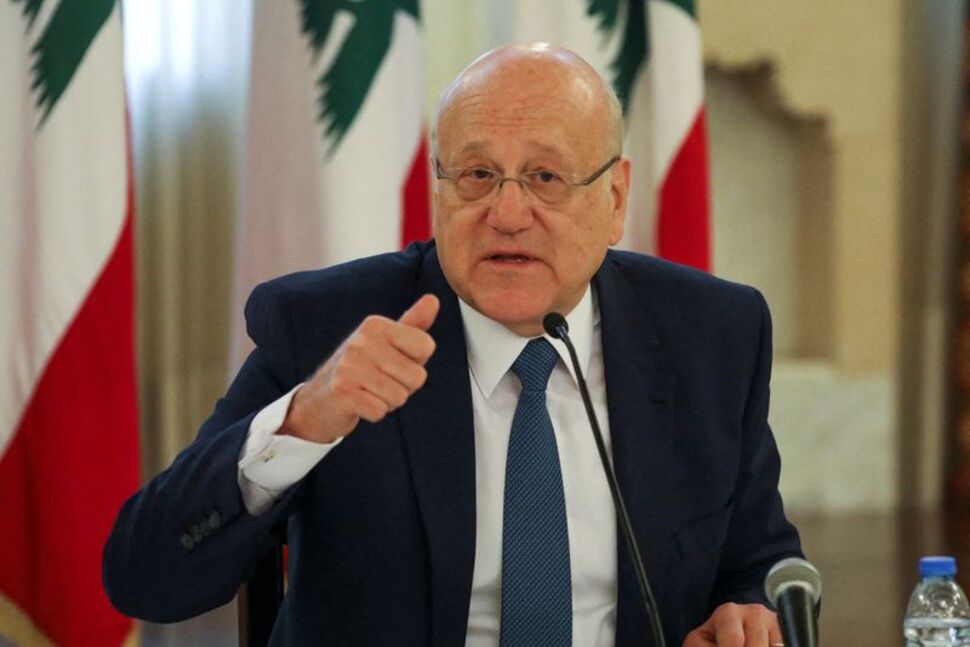
by reuters — Lebanon’s prime minister said on Wednesday the government had not interfered with the judiciary’s work, after reports that he had put pressure on a judge who is seeking data from banks in an investigation into the conduct of the central bank governor. Prime Minister Najib Mikati said last month that veteran Governor Riad Salameh, who is at the center of domestic and international probes over allegations ranging from fraud to embezzlement, should stay in his job to avoid adding to problems in Lebanon as it navigates a deep financial crisis. “It is also necessary to clarify what came out yesterday (Tuesday) about matters related to the judiciary. In this context, I say it is not true that we interfered in the work of the judiciary or in any decision taken by the judiciary,” Mikati told a news conference. Al Akhbar and other Lebanese news outlets said Mikati had called Lebanon’s top prosecutor, Ghassan Oueidat, and threatened to resign if Judge Jean Tannous continued to press banks for data in his investigation. The Tannous probe is investigating allegations of embezzlement and other misconduct at the central bank involving about $300 million in gains made by a company owned by Salameh’s brother, Raja.
Oueidat did not respond to a request for comment. Reuters has been unable to reach Raja Salameh and the central bank said it did not have his contact details. Riad Salameh, who has run the bank for almost three decades, has repeatedly denied the accusations of wrongdoing being investigated by Tannous or by other Lebanese and international probes. Two sources told Reuters that members of Lebanon’s state security had visited at least two commercial banks on Tuesday as part of the Tannous investigation, seeking information on the governor’s brother. One of the sources with knowledge of one visit said the security officials initially pressed bank officials hard for data but then suddenly changed tack, softening their demands. “The security forces got friendlier and started asking general questions rather than specifics… and that’s it, and they left,” the source said, asking not to be named because of the sensitivity of the issue.
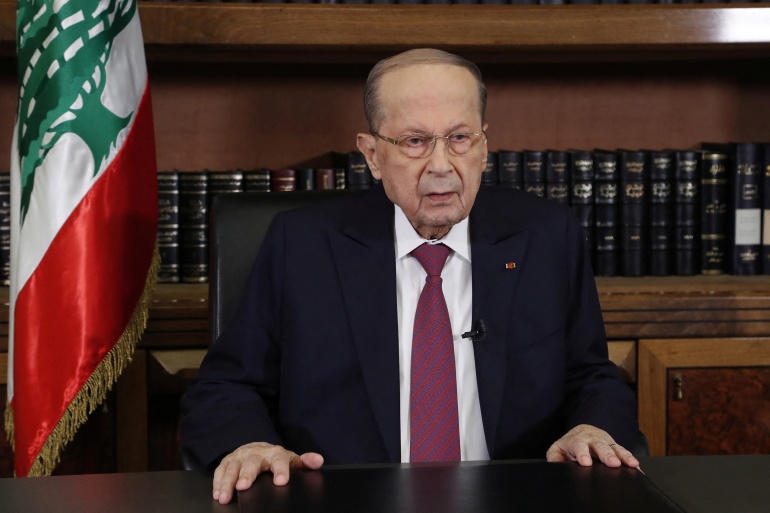
By Dale Gavlak — voanews.com — Political opponents of Lebanese President Michel Aoun are resisting his call for a national dialogue conference on the worsening economic crisis and other issues, sensing he may try to use it for his and Hezbollah’s political gain. Meanwhile, the nation’s currency has plummeted further, by more than 15% of its value since the start of the year, leading to more misery for ordinary Lebanese. Michel Aoun, Lebanon’s Christian president who provides political cover for the Iran-backed Shiite Hezbollah militia and political powerbroker, says a national defense strategy could be part of the talks. Lebanon observer Michael Young said calling for a national “defense strategy has particular resonance for Hezbollah.” Writing in Dubai’s The National newspaper, Young said this is “another term for finding a formula to integrate the party’s weapons arsenal into the state.”
Many Lebanese have long called for Hezbollah, which is the only militia to have kept its arms from Lebanon’s 1975 to 1990 civil war, to decommission its weapons. But Aoun’s opponents suspect he may be hedging for talks as a means to corner Hezbollah into bolstering his son-in-law Gebran Bassil’s chances to succeed him in the presidency when his term ends later this year. So far, former Sunni Muslim prime minister Rafik Hariri, Druze leader Walid Jumblatt, and Aoun’s Christian rival Samir Geagea have rejected his invitation for talks. Habib Malik of the Lebanese American University told VOA he sees Aoun and Bassil jockeying for influence ahead of elections for parliament in May and those for the presidency later in the year. “It is political theater. Much of it is contrived and calculated with very clear aims in mind. Bassil is sinking fast in terms of any popularity among the Christians and for him to even remotely hope to succeed in the upcoming May elections, let alone be Hezbollah’s candidate for the presidency next November, he’s going to really have to put on a Houdini-like contortion. What we are seeing right now is a calculated move to try and polish his image before any remaining gullible Christians,” he said.
لماذا الإمعان في معاكسة إرادة الشعب اللبناني ومصالحه عبر الإصرار على مهاجمة دول الخليج واستعداء المملكة العربية السعودية؟ ألا تستحق المصلحة الوطنية العليا تجاوز العواطف الشخصية؟ الا يتوجب على الجميع وفي مقدمتهم رئيس البلاد مصارحة “حزب الله” بوجوب التوقف عن الإساءة إلى علاقاتنا الخارجية والإقلاع عن سياسة عزل لبنان عن محيطه والعالم؟ اهكذا تجري التهيئة […]
PARIS (REUTERS) – France’s foreign minister said on Tuesday (Jan 11) the United Arab Emirates would join a Saudi-French fund that aimed to provide support to the Lebanese people. Riyadh and Paris agreed in early December last year to establish a common humanitarian mechanism to alleviate the suffering of the Lebanese as a first step […]

BEIRUT, Jan 11 (Reuters) – A Lebanese judge said on Tuesday she had imposed a travel ban on central bank governor Riad Salameh, who is at the centre of investigations into alleged fraud and other misconduct launched after Lebanon was plunged into a deep financial crisis. Salameh, who said he had no knowledge of the ban and denied any wrongdoing, is being probed by the authorities in Lebanon and at least four European countries, including a Swiss inquiry over alleged money laundering. Salameh, who has been governor for almost three decades, has stayed in his post even as the economy has been crushed by a mountain of debt, the currency has collapsed and swathes of the nation have been driven into poverty. read more
Judge Ghada Aoun told Reuters she had imposed the ban as part of a Lebanese investigation she was leading into Salameh’s conduct and said the next step would be to seek to question him. When asked about allegations ranging from fraud to abuse of public funds being investigated in the Lebanese probe, Salameh said: “These cases raised against me personally are part of the campaign to fool the public opinion.” “All the actions of the central bank are executed according to the law of money and credit and thus are not the actions of one person that takes decisions by himself,” he told Reuters.
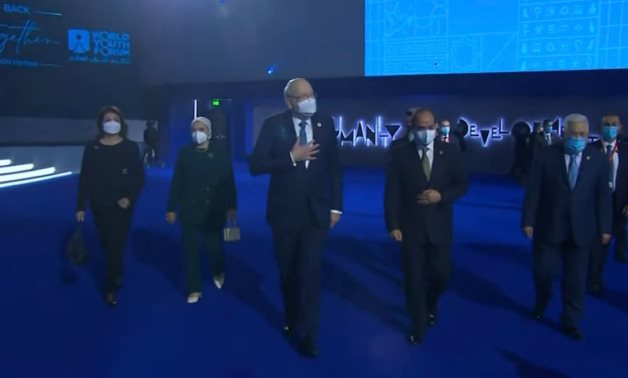
CAIRO – Lebanon’s Prime Minster Najib Mikati arrived Monday morning in in Sharm El-Sheikh city to participate in opening ceremony of Egypt’s 4th edition of the World Youth Forum [WYF]. Mikati accompanied President Sisi, Palestinian President Mahamoud Abbas and Crown Prince of Jordan Hussein bin Abdullah II. At the ceremony, President Sisi said that WYF became a platform for dialogue and exchange visions between youth and countries all over the world. He announced officially launching the 4th edition of WYF activities. The forum is held under the slogan of ‘Back Together’, with the participation of young people from 196 countries in Sharm El-Sheikh. WYF activities are expected to take place until January 13. 2021’s WYF agenda includes number of vital topics, which reflect the features of the new reality after Coronavirus pandemic, that affected the lives of millions all over the world.
Participants at the 4th edition of WYF had the choice to participate in the opening session either physically or remotely via the virtual system due to COVID-19. The main session of WYF is supposed to Kick off shortly after the opening ceremony, to be entitled ‘Corona Pandemic: Alarm for Humanity and New Hope’. Palestinian President Mahmoud Abbas arrived in Egypt on Sunday to participate in the he fourth edition of Egypt’s World Youth Forum. President Abbas’ two day-visit comes at President Abdel Fattah El Sisi’s invitation to attend the forum activities, the Palestinian embassy in Egypt said.



